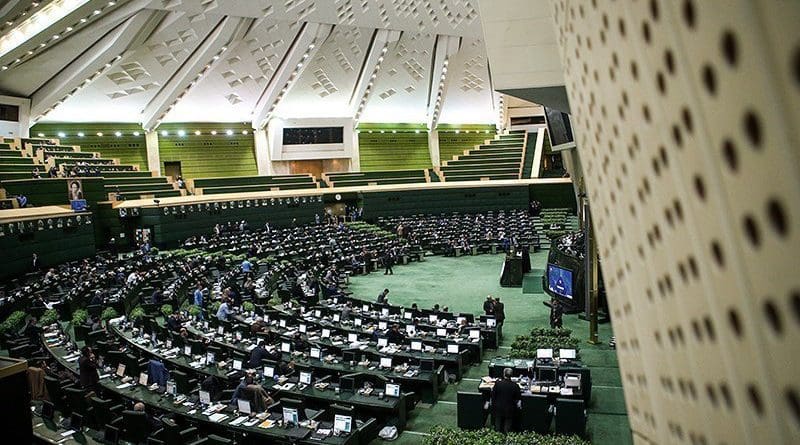Iran: Regime Can’t Even Trust Its Own Parliament – OpEd
All members of the Majlis (parliament) are people who for more than four decades have actively participated in the regime’s crimes, theft, and the exploitation of the people’s rights. Without exception, they all have a background in Islamic Revolutionary Guard Corps (IRGC) and members of the terrorist force of the Quds, the Ministry of Intelligence, and other suppressive organs.
All these members who have passed through multiple vetting and security checks before reaching the seat of the Majlis and have proven themselves in crime and betrayal over the years, are now under suspicion and mistrust by the regime. The security and intelligence organs of the regime constantly monitor them.
The claim is supported by many documents and records published from servers of the Majlis and its news agency, Khaneye Mellat. Reflecting on some of these documents sheds more light on the matter: the collection and transmission of telephone numbers of all representatives and employees of the Majlis to the security and intelligence institutions for monitoring their possible presence in protest gatherings and cooperation with protesters:
1) A confidential report from the Security Chief of the Majlis to Majlis Speaker Mohammad Bagher Ghalibaf on September 26, 2022 about measures regarding nationwide protests
2) A confidential letter from the Security Chief of the Majlis to Ghalibaf regarding the necessity of the participation of security staff in commission meetings
The meaning of these documents and the dissemination of this letter, which includes “cooperation with disruptors,” implies that the regime’s intelligence and security apparatus have suspicions about the members of the Majlis. Not only in terms of their contacts and activities outside the Majlis but even within the Majlis and the commissions, security agents and security staff must be present to monitor and observe their discussions and the topics they raise.
In addition to these continuous and systematic surveillance measures, the obtained documents indicate that elements of the IRGC, Basij forces, intelligence, and security have filled all the internal structures of the Majlis, as well as all the loopholes and surroundings of the Majlis. These include:
– The names of 14 IRGC agents sent to the Majlis, including two officials of the advisors’ office, two advisors to the Speaker of the Majlis, a public relations specialist, two communications specialists, and the commander of the parliamentary Basij force.
– The profiles of 506 Basij members from the Majlis Supreme Audit Court, which is one of the seven Basij bases of the Majlis.
– The profiles of 171 Basij members from the Library Base, another one of the seven Basij bases of the Majlis.
– The profiles of the commander and staff of the parliamentary security quick reaction force.
– The members of the quick reaction teams, along with their combat duties mentioned.
The reality is that with the multiple covert strikes on the regime’s nuclear and military institutions, during which the most sensitive points were destroyed and some of the highest-ranking officials and key elements were eliminated in the most protected military locations inside the country or in Syria and Iraq, espionage and infiltration at the highest political and military levels have become impossible to conceal. As a result, supreme leader Ali Khamenei and other figures in regime are warning about the issue of infiltration.
On February 18, Mizan news agency quoted Judiciary Chief Gholamhossein Mohseni Eje’I who addressed the personnel and leaders of the IRGC’s intelligence protection and warned them in detail about the “dangers of infiltration” and the “various areas of infiltration in the sectors and apparatuses” of the regime, urging them to “God forbid, not to reach a crisis.”
A member of the Majlis, Hedayatollah Khademi, in another example, spoke about the extent of infiltration and said, “Now, it is likely that Qatar, Saudi Arabia, and Kuwait also have infiltrations within our systems.”
As a result, the monitoring of the members of the Majlis is not a result of mere delusion; rather, it stems from a genuine sense of serious threat. However, the contradiction lies in the fact that in this corrupt and decaying regime, how can it be known that elements of security, intelligence, etc. themselves are not infiltrators?
Since the regime fundamentally prioritizes its own survival and sacrifices everything else for this goal, even its closest individuals who were deeply loyal and committed record-breaking crimes and atrocities are viewed with suspicion. The conclusion that can be drawn is that the regime is in a steep decline towards the point of total collapse and has lost all capacity for maneuvering to preserve its integrity. The weakening of regime forces can be disastrous for it, like a body whose vital organs gradually lose their functionality. This cancerous tumor within the regime is causing the disintegration of its ideological integrity, which has committed crimes for 45 years, and its pillars are crumbling. The outlook for this regime is nothing but overthrow at the hands of the Iranian people.

